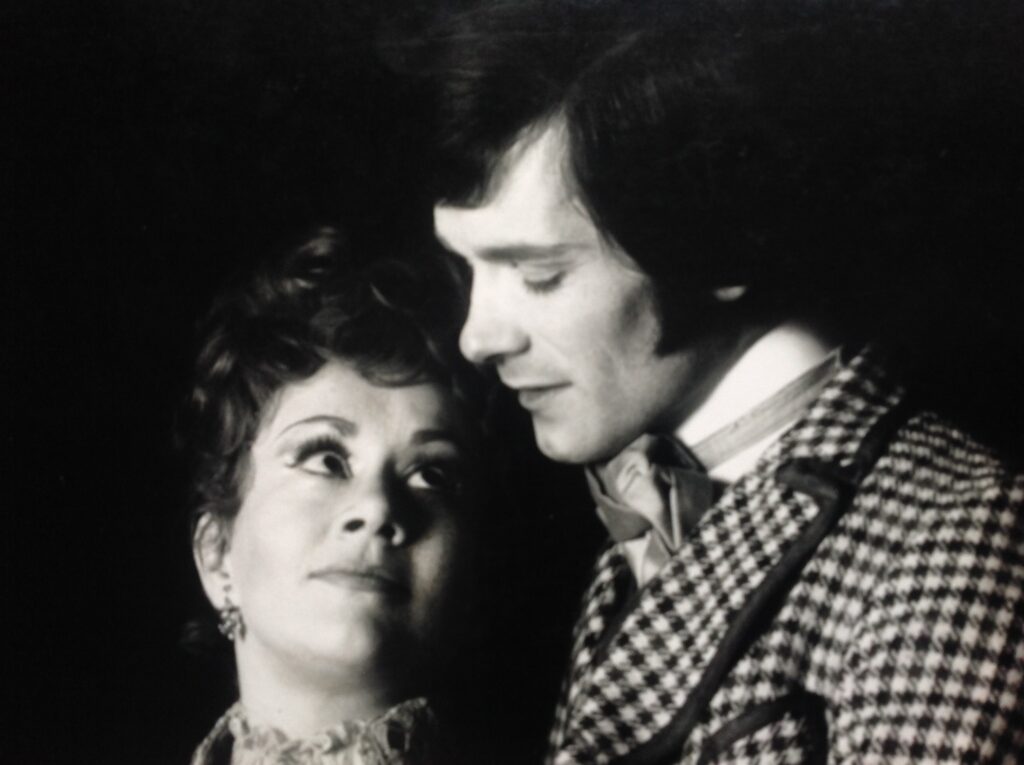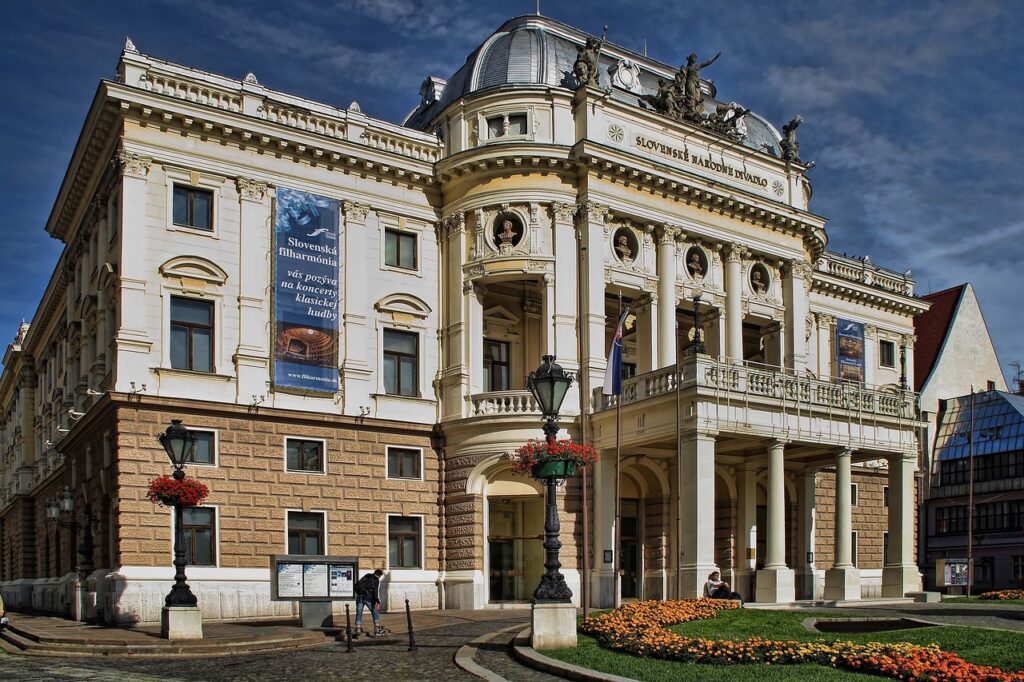
The world of theatre and cinema mourns the passing of Dame Joan Plowright, one of Britain’s most revered stage and screen stars, who died peacefully on January 16, 2025, at the age of 95. Her illustrious career, spanning an extraordinary seven decades, saw her earn a Tony Award, two Golden Globes, and nominations for both an Oscar and an Emmy, solidifying her status as an era-defining actress. As the widow of Sir Laurence Olivier, she was also intrinsically linked to one of the most significant figures in British theatrical history, yet her own formidable talent forged an indelible mark on the performing arts.
Dame Joan, born Joan Ann Plowright in Brigg, Lincolnshire, was a formidable force whose dedication to her craft helped revitalize the U.K.’s theatrical scene in the decades following World War II. Her family’s statement encapsulated her essence, noting her “Plowright grit and courageous determination” in overcoming challenges, including the blindness that led to her retirement a decade ago. Her journey from childhood involvement in amateur drama to becoming a dame of the realm speaks to a life lived with unwavering passion and artistic integrity.
This in-depth retrospective delves into the key milestones and defining moments that shaped Dame Joan Plowright’s remarkable trajectory. Through a series of illuminating insights, we will explore her early life and theatrical foundations, her pivotal roles that redefined British theatre, and the profound partnerships that enriched her artistic and personal life, charting the course of an actress whose influence resonated across generations and continues to inspire.

1. **Early Life and Foundation in Theatre** Joan Ann Plowright’s lifelong journey into the performing arts began remarkably early, rooted in her childhood in Brigg, Lincolnshire. From the tender age of three, she was immersed in the world of theatre, largely due to her mother’s active role in running an amateur drama group. This early exposure cultivated a natural affinity for the stage, transforming school vacations into opportunities for further study at summer sessions of university drama schools. Such an upbringing fostered not just talent, but a profound understanding and respect for the theatrical craft from its nascent stages.
Her formal training further honed this nascent talent, providing the rigorous foundation upon which her celebrated career would be built. After completing high school, Plowright pursued her studies at the Laban Art of Movement Studio in Manchester, an institution known for its innovative approach to physical expression and stage presence. This period of intense learning was quickly followed by a significant achievement: she earned a prestigious two-year scholarship to the drama school at the Old Vic Theatre in London, a hallowed institution with a rich history of nurturing acting talent.
The training at the Old Vic was instrumental, placing her within an environment steeped in theatrical tradition while also embracing emerging trends. This comprehensive education equipped Plowright with a versatility that would become a hallmark of her performances across diverse roles and genres. Her dedication to mastering her craft from such a young age laid the groundwork for the “dazzling versatility” that would define her contributions to both stage and screen, setting her apart as an actress of exceptional depth and range.
Read more about: The Indelible Reign of Prince: A Forbes Retrospective on the Musical Genius, Financial Acumen, and Cultural Impact of an Icon

2. **Breakthrough at the Royal Court and the “Angry Young Men” Era** Following her London stage debut in 1954, Joan Plowright swiftly ascended to prominence, becoming a member of the Royal Court Theatre in 1956. This institution was at the vanguard of a theatrical revolution in Britain, becoming the crucible for the “Angry Young Men” movement. Playwrights like John Osborne spearheaded a wave of new dramas that injected a raw, rough-hewn realism into British theater, challenging conventional narratives and offering unflinching portrayals of working-class life. Plowright found herself at the heart of this transformative period.
Her involvement with the Royal Court, particularly in productions that championed this new realism, allowed her to showcase a distinctive acting style that resonated deeply with audiences. She was part of a cohort of innovative, working-class actors, including peers such as Albert Finney, Alan Bates, and Anthony Hopkins, who collectively brought a fresh, authentic energy to the stage. This era was characterized by a departure from the more classical, often stylized, performances of previous generations, embracing a grittier, more relatable form of expression that mirrored the changing social landscape of post-war Britain.
David Hare, the celebrated playwright, later observed that Plowright “represented, at that point, a new realism in the theatre – a working class background, obviously, like many of her contemporaries.” This commentary underscores her pivotal role in defining the sensibility of this groundbreaking period. Her performances were not merely enactments but embody an honest, unvarnished portrayal of characters, making her an essential figure in the radical reinvention of British drama and establishing her as a serious and impactful presence on the London stage.
3. **”The Entertainer”: A Pivotal Acting and Romantic Partnership** One of Joan Plowright’s most significant early collaborations came in 1957 when she co-starred opposite Laurence Olivier in John Osborne’s “The Entertainer” at the Royal Court. This production marked a pivotal moment in her career, not only for its critical acclaim but also for initiating one of theatre’s most iconic partnerships, both on and off stage. In this seminal play, Plowright portrayed Olivier’s daughter, forging an intense professional connection that soon blossomed into a profound personal relationship.
The chemistry between Plowright and Olivier was undeniable, fueling the powerful dynamics of their stage performances. At the time, both were married — Olivier to the legendary Vivien Leigh, and Plowright to her first husband, Roger Gage. Despite these circumstances, their bond deepened, laying the groundwork for a future that would see them united as husband and wife. The play’s success led to a film adaptation in 1960, in which they reprised their roles, further cementing their on-screen collaboration and earning them both Bafta nominations.
This period truly served as a crucible for their intertwined destinies. The critical recognition for their performances in “The Entertainer” underscored their artistic synergy, demonstrating a shared vision and intensity that transcended individual talent. It was more than just a successful play; it was the genesis of a connection that would shape British theatre for decades to come, bringing together two extraordinary talents in a union that profoundly influenced their respective careers and the broader cultural landscape.

4. **Broadway Triumph with “A Taste of Honey”** In the same landmark year of 1960, Joan Plowright achieved a significant breakthrough in the United States with her performance in “A Taste of Honey” on Broadway. This role marked her formal introduction to American audiences and critics, who were captivated by her remarkable talent and stage presence. Her portrayal in Shelagh Delaney’s gritty kitchen-sink drama, which explored themes of adolescence, race, and sexuality, resonated deeply, showcasing her ability to inhabit complex characters with profound authenticity.
The critical acclaim for her Broadway performance was immediate and overwhelmingly positive. Plowright’s nuanced and powerful portrayal earned her the prestigious Tony Award, one of the highest honors in American theatre, for her exceptional work. This victory not only solidified her reputation as an actress of international caliber but also served as a clear signal of her undeniable star power beyond the British stage. It was a testament to her versatility and the universal appeal of her acting prowess.
Winning a Tony Award on her Broadway debut was a monumental achievement, distinguishing her as a standout talent among her peers. This success further broadened her professional horizons, offering her new opportunities and expanding her reach. It affirmed that her unique blend of “new realism” and innate dramatic skill was not confined to London’s West End but could captivate and move audiences on the global stage, marking a crucial moment in her trajectory toward becoming a truly international acting legend.
5. **Becoming a Central Pillar of the National Theatre** Joan Plowright’s influence extended far beyond her individual performances, cementing her role as a foundational figure in the establishment and growth of the National Theatre. When Sir Laurence Olivier, whom she married in 1961, embarked on the ambitious endeavor of setting up the National Theatre at the Old Vic in the early 1960s, Plowright became a leading member of the extraordinary acting company he assembled. This group included other luminaries such as Maggie Smith, Michael Redgrave, Derek Jacobi, and Michael Gambon, forming a formidable collective that would redefine British theatrical excellence.
Her “contribution as one of the central pillars of the National Theatre cannot be overstated,” as affirmed by the institution’s current director, Rufus Norris. Plowright delivered “an extraordinary series of celebrated performances” during her tenure, gracing the stage in iconic plays like “Uncle Vanya,” “Saint Joan” (a role she had previously excelled in), “The Master Builder,” “Much Ado About Nothing,” and “Three Sisters.” In many of these productions, she acted alongside Sir Laurence Olivier, creating a powerful artistic partnership that was a cornerstone of the National’s early success and prestige.
Beyond her acclaimed roles, Plowright’s impact offstage was similarly profound. Playwright David Hare noted the “not very easy task of being Laurence Olivier’s wife while Laurence Olivier was running the theatre,” a situation he said “she handled… extremely well.” This speaks to her strength, wisdom, and the crucial, often unacknowledged, support she provided in shaping the nascent institution. She remained a “personal friend to and champion of the National Theatre throughout its history,” embodying its spirit and contributing to its enduring legacy far beyond her active performing years.
Read more about: China’s Naval Ascendancy: A Data-Driven Examination of its World-Class Fleet’s Strengths and Strategic Vulnerabilities

6. **Acclaimed Stage Performances and Major Theatre Awards** Throughout her stage career, Joan Plowright distinguished herself with an impressive array of acclaimed performances, earning significant accolades that underscored her mastery of the theatrical craft. One such standout role was her portrayal of Joan of Arc in George Bernard Shaw’s “Saint Joan” in 1963. This powerful performance garnered her the Best Actress award at the Evening Standard Theatre Awards, solidifying her reputation as an actress capable of tackling complex, totemic female roles with exceptional depth and conviction.
Another testament to her brilliance on stage came in 1978 with her performance in “Filumena.” For this role, Plowright received a Society of West End Theatre Award, an honor that would later be renamed the Olivier Awards in tribute to her late husband, Sir Laurence Olivier. Winning this award, which now bears her husband’s name, serves as a poignant reminder of her own immense contributions to London’s West End and the broader British theatre landscape, recognizing her as a peer among the greats.
These major theatre awards were not isolated incidents but rather highlights within a continuous stream of challenging and celebrated stage work. From classics like Anton Chekhov’s “The Seagull” and William Shakespeare’s “The Merchant of Venice” to the avant-garde challenge of Eugene Ionesco’s “The Chairs” and Shaw’s “Major Barbara,” Plowright consistently demonstrated a remarkable range. Her ability to inhabit such diverse characters, imbued with a “dazzling versatility,” showcased her deep understanding of human nature and her unwavering commitment to bringing complex narratives to life on the stage.
Read more about: The Indelible Reign of Prince: A Forbes Retrospective on the Musical Genius, Financial Acumen, and Cultural Impact of an Icon

7. **The Intertwined Lives: Her Marriage to Laurence Olivier** The marriage of Joan Plowright to Sir Laurence Olivier in 1961 was not merely a personal union but a merger of two titanic figures in the world of British theatre, profoundly shaping both their lives and careers. Their relationship, which began while both were still married to others, blossomed into a bond characterized by deep affection and mutual artistic respect. Olivier’s own words, penned in a love letter, eloquently captured the profound impact Plowright had on him: “I sometimes feel such a peacefulness come over me when I think of you, or write to you — a gentle tenderness and serenity. A feeling devoid of all violence, passion or shattering longing… it makes me go out into the street with a smile on my face and in my heart for everybody.”
Their partnership extended powerfully into their professional lives, most notably at the nascent National Theatre, where Olivier was the director and Plowright a leading lady. This dynamic, as playwright David Hare observed, presented Plowright with the “not very easy task of being Laurence Olivier’s wife while Laurence Olivier was running the theatre.” Yet, she navigated this complex role with remarkable grace and strength, earning admiration for her ability to maintain her own artistic identity while supporting her husband’s monumental undertaking. Hare further recounted her as “an incredibly wise and witty woman,” who used “humour all the time to defuse some of the tensions that grew up around her husband.”
Their life together was a blend of artistic collaboration and personal devotion, lasting until Olivier’s death in 1989. While the shadow of Olivier’s fame was immense, Plowright carved out her own undeniable space, earning accolades and establishing her legacy independently. Her dedication to him, both in life and in preserving his memory as “keeper of the Olivier flame” after his passing, speaks volumes about the depth of their connection. Their marriage remains a compelling narrative within the annals of British cultural history, a testament to shared passion and enduring love amidst the glare of public life.
8. **A Versatile Film Career Resurgence**While Dame Joan Plowright’s early career was predominantly defined by her revolutionary stage work, her later decades saw a significant flourishing on screen, particularly after the passing of Sir Laurence Olivier in 1989. Approaching her sixties, Plowright experienced a remarkable career resurgence, showcasing her adaptability across a diverse range of cinematic projects. Her initial foray into film had been an uncredited appearance in John Huston’s epic 1956 adaptation of Herman Melville’s “Moby Dick,” but her post-1989 work brought her widespread recognition in film and television.
This period was marked by her ability to balance roles that appealed to both discerning critics and broader commercial audiences. She graced the screen in acclaimed literary adaptations such as Franco Zeffirelli’s 1996 version of Charlotte Brontë’s “Jane Eyre” and the Merchant-Ivory production of “Surviving Picasso.” Simultaneously, she captivated family audiences as the stalwart nanny in Disney’s live-action remake of “101 Dalmatians” in 1996, starring alongside Glenn Close, and also appeared opposite Walter Matthau in the big screen adaptation of the classic comic strip “Dennis the Menace.”
Her filmography from this era also included a brief appearance in the 1993 Arnold Schwarzenegger satire “Last Action Hero” and an earlier BAFTA nomination in 1978 for her performance in the film version of “Equus” alongside Richard Burton. While not every project found universal acclaim, with ventures like “The Scarlet Letter” and a TV pilot based on “Driving Miss Daisy” proving less successful, and a 2011 comedy “Goose on the Loose” not rousing critics, this extensive body of work underscored her enduring appeal and her commitment to exploring diverse characters across different genres until her retirement.
Read more about: Mark Volman, Co-Founder of The Turtles and Flo & Eddie, A Celebrated Voice Who Shaped Pop and Advocated for Artists, Dies at 78

9. **Oscar Nomination and Dual Golden Globe Triumphs**Among her illustrious array of accolades, Dame Joan Plowright achieved significant recognition from the global film industry, most notably an Academy Award nomination and a rare double Golden Globe win. Her performance in the 1991 film “Enchanted April” proved particularly impactful, earning her widespread critical acclaim for her portrayal of the elegant but somewhat peevish Mrs. Fisher, a role that resonated deeply with audiences and critics alike.
This compelling performance garnered her not only a Golden Globe Award for Best Supporting Actress in a Motion Picture but also a prestigious nomination for the Oscar for Best Supporting Actress in 1993. The film, which delicately explored the transformative power of a vacation to Italy for a group of British women, provided a perfect canvas for Plowright’s nuanced acting, demonstrating her command of both subtlety and wit on screen.
In the same remarkable year of 1993, Dame Joan achieved an extraordinary feat, becoming one of only a handful of actors to secure two Golden Globes. Beyond her win for “Enchanted April,” she also received the supporting actress TV award for her powerful role in “Stalin,” a testament to her versatility across different mediums. These dual victories solidified her status as an internationally recognized talent, capable of delivering performances that garnered the highest honors in both film and television.
Read more about: 14 Hollywood Deaths That Changed Everything: Prepare to Be Amazed by Their Lasting Impact!
10. **A Dame Among Dames: Elevating British Acting**Dame Joan Plowright was not merely an exceptional actress; she was a luminary among a distinguished generation of British actors, many of whom also held the esteemed title of Dame. This cohort, which included iconic figures such as Judi Dench, Maggie Smith, Eileen Atkins, and Vanessa Redgrave, collectively represented a golden age of British theatrical and cinematic talent. Plowright herself was officially made a Dame by Queen Elizabeth II in 2004, a fitting recognition of her profound contributions to the performing arts.
Her shared legacy with these formidable peers was memorably showcased in film and television. In 1999, she appeared alongside Dame Judi Dench and Dame Maggie Smith in the acclaimed film “Tea with Mussolini,” a narrative that brought together some of Britain’s most celebrated actresses. This collaboration offered audiences a rare opportunity to witness their collective talent and chemistry on screen, highlighting their enduring presence in the industry.
More recently, her presence among these legends was celebrated in the 2018 BBC documentary “Nothing Like A Dame.” The film provided an intimate glimpse into the camaraderie, wit, and shared experiences of these extraordinary women, including Dame Judi Dench, Dame Maggie Smith, and Dame Eileen Atkins, offering a poignant and often humorous reflection on their lives and careers. This collective recognition underscored Dame Joan’s integral position within this exceptional group of British acting royalty.
11. **The Wit and Wisdom of a Legend: Insights from a Viral Moment**The 2018 BBC documentary “Nothing Like A Dame” offered a particularly revealing and cherished glimpse into Dame Joan Plowright’s character, showcasing her famed wit and ability to connect with others, even amidst personal challenges. A clip from the documentary, which swiftly gained viral attention online, captured a memorable exchange between Dame Maggie Smith and Dame Judi Dench, with Smith playfully remarking that Dench was “always asked first” for acting roles.
Initially, Dame Joan missed this humorous moment due to a hearing aid that had become dislodged. However, upon being brought into the conversation, she instantly grasped the jest and, with characteristic good humor, joined in, recounting a similar story from her own experiences. This anecdote not only highlighted her sharp mind and quick wit but also her relatable humanity, as she shared a common experience with her esteemed colleagues.
This specific interaction underscored playwright David Hare’s observation that Dame Joan was “an incredibly wise and witty woman” who frequently employed “humour all the time to defuse some of the tensions that grew up around her husband.” Even in her later years, navigating challenges like hearing impairment, her capacity for laughter and shared enjoyment remained undimmed, painting a picture of an actor who was as gracious and engaging offstage as she was formidable on it.

12. **Keeper of the Olivier Flame: Preserving a Legacy**Following the death of Sir Laurence Olivier in 1989, Dame Joan Plowright embraced a profound and significant role as the dedicated guardian of his immense legacy, often referred to as the “keeper of the Olivier flame.” This commitment extended beyond personal remembrance, manifesting in public efforts to honor his memory and ensure his monumental contributions to theatre were accurately preserved and understood. Her position as his widow meant she carried a unique responsibility in the narrative of one of Britain’s most revered actors.
Her dedication involved a range of activities, including bestowing awards in his honor, actively defending his reputation in the press, and meticulously curating his extensive collection of letters. This was a conscious choice, as she articulated in a 2003 interview with The Daily Telegraph, stating, “That is my choice because I was privileged to live with him.” She recognized the inevitable ebb and flow of public perception that follows a figure of such celebrity.
Plowright explained her motivation further, noting that “When someone who has had such fame and idolatry and worship goes, then there’s bound to be a backlash which comes the other way and you get a bit sick of that. Mine was really trying to put things straight.” Her efforts were instrumental in providing balanced perspectives and ensuring that Olivier’s artistic achievements and personal character were remembered with clarity and respect, solidifying her enduring commitment to the man with whom she shared so much of her life and art.

13. **Resilience and Final Years: Overcoming Adversity**Dame Joan Plowright’s long and illustrious career, spanning an extraordinary seven decades, was marked not only by artistic triumphs but also by remarkable personal resilience, particularly in her later years. She faced significant challenges, including the gradual loss of her eyesight, which ultimately led to her retirement from acting a decade ago, after being registered blind. Her family’s statement eloquently captured her spirit, highlighting her “Plowright grit and courageous determination” in confronting and making the best of these adversities.
Despite her profound visual impairment, Dame Joan continued to live a rich and meaningful life. Her family confirmed that she “cherished her last 10 years in Sussex with constant visits from friends and family, filled with much laughter and fond memories.” This period underscores her unwavering ability to find joy and connection, transforming potential isolation into a time of warmth and fellowship, a testament to her resilient spirit.
Reflecting on her life, Dame Joan herself once shared a poignant sentiment in a 2010 interview with The Actor’s Work: “I’ve been very privileged to have such a life. I mean it’s magic and I still feel, when a curtain goes up or the lights come on if there’s no curtain, the magic of a beginning of what is going to unfold in front of me.” Even as she faced the curtain closing on her acting career, her deep love for the theatre and her gratitude for a life lived in artistry shone through, leaving an inspiring message of appreciation for the creative journey.
Read more about: Still Kicking It at 100 (and Beyond!): 7 Legendary Celebs Who Totally Smashed the Centenarian Club Goals
14. **Enduring Tributes and Lasting Impact**The passing of Dame Joan Plowright on January 16, 2025, at the age of 95, elicited a wave of heartfelt tributes across the world of arts and culture, affirming her indelible mark on the industry. London’s West End theatres, a place she so frequently graced, dimmed their lights for two minutes in her honor, a time-honored gesture of profound respect for a theatrical icon. This act symbolized the deep esteem in which she was held by her peers and the institutions she helped shape.
Further testament to her lasting impact came from leaders in the British theatre community. Hannah Essex, co-chief executive of UK Theatre and Society Of London Theatre, lauded Dame Joan as “an iconic and deeply respected figure in the world of theatre, leaving an indelible mark on the industry she shaped with her talent and dedication.” Her statement underscored the collective recognition of Plowright’s significant contributions and enduring legacy, extending heartfelt condolences to her family and loved ones.
Beyond the grand stages of London, a more personal tribute resonated from her hometown. The operators of the Plowright Theatre in Scunthorpe, named after her in the 1990s, expressed their sadness and pride, noting that “Born in Brigg she became one of the most distinguished actors of her generation.” This theatre held a special connection, as her father, Bill Plowright, had founded the Scunthorpe Little Theatre Club which still performs there, linking her professional acclaim back to her familial roots in amateur drama.
Dame Joan is survived by her three children—Tamsin, Richard, and Julie-Kate, all of whom have pursued acting careers—and several grandchildren, ensuring that her legacy of talent and dedication continues through future generations. Her life story is a powerful narrative of artistic excellence, unwavering resilience, and profound influence, demonstrating how a singular talent can inspire, challenge, and enrich the cultural landscape for decades, leaving behind a truly unforgettable imprint on the annals of theatre and film.
Read more about: 14 Jaw-Dropping Moments From The ACM Awards That Had Us All Doing A Double Take (Seriously, Keith Urban Was There!)
Dame Joan Plowright’s life was a masterclass in dedication, adaptability, and unwavering spirit. From the raw, transformative energy of the Royal Court to the glittering heights of Hollywood, she navigated every stage with grace, wit, and formidable talent. She was not just an actress who performed roles, but a force who helped define eras, a pillar of foundational institutions, and a compassionate individual who left an indelible mark on all who witnessed her art. Her journey, steeped in the magic of performance and the strength of character, will undoubtedly continue to inspire aspiring artists and captivate audiences for generations to come.









